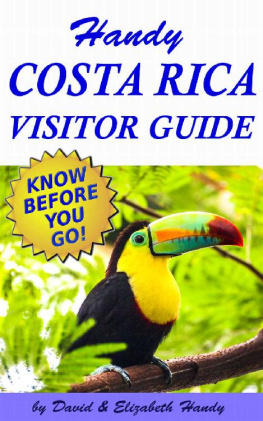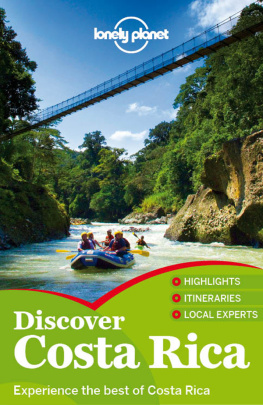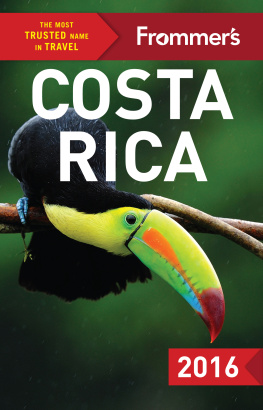MEGAN RIVERS-MOORE is assistant professor at the Pauline Jewett Institute of Womens and Gender Studies at Carleton University in Ottawa, Canada.
The University of Chicago Press, Chicago 60637
The University of Chicago Press, Ltd., London
2016 by The University of Chicago
All rights reserved. Published 2016.
Printed in the United States of America
25 24 23 22 21 20 19 18 17 16 1 2 3 4 5
ISBN-13: 978-0-226-37338-6 (cloth)
ISBN-13: 978-0-226-37341-6 (paper)
ISBN-13: 978-0-226-37355-3 (e-book)
DOI: 10.7208/chicago/9780226373553.001.0001
Library of Congress Cataloging-in-Publication Data
Names: Rivers-Moore, Megan, author.
Title: Gringo Gulch : sex, tourism, and social mobility in Costa Rica / Megan Rivers-Moore.
Description: Chicago ; London : The University of Chicago Press, 2016. | Includes bibliographical references and index.
Identifiers: LCCN 2015042765 | ISBN 9780226373386 (cloth : alk. paper) | ISBN 9780226373416 (pbk. : alk. paper) | ISBN 9780226373553 (e-book)
Subjects: LCSH: ProstitutionCosta RicaSan Jos. | ProstitutesCosta RicaSan JosSocial conditions. | Sex tourismCosta RicaSan Jos. | NeoliberalismSocial aspectsCosta RicaSan Jos. | TransnationalismSocial aspectsCosta RicaSan Jos.
Classification: LCC HQ154.S26 R58 2016 | DDC 306.74097286dc23 LC record available at http://lccn.loc.gov/2015042765

This paper meets the requirements of ANSI/NISO Z 39.48-1992 (Permanence of Paper).
This book was a decidedly transnational affair, having been written in Cambridge, San Jos, Geneva, London, and Toronto. A new job at Carleton University in Ottawa further expanded this projects geographies, both physical and human. As such, the list of people who contributed and to whom I am profoundly grateful is long indeed.
This research was made possible by very generous financial support from the Association of Commonwealth Universities, the Centre of Latin American Studies, the Cambridge Political Economy Society Trust, a Murray Edwards Overseas Bursary, and travel grants from the Worts Travelling Scholars Fund, Murray Edwards Grants for Graduate Research, and the Murray Edwards MCR. The manuscript was significantly revised and updated while I was a SSHRC Postdoctoral Fellow at the University of Toronto.
My work has benefited from feedback from a veritable army of brilliant and generous scholars and comrades. Thank you, Sarah Radcliffe, David Lehmann, Juan Maiguashca, Elizabeth Bernstein, Peter Wade, Nayanika Mathur, Jessica Dionne, Mnica Moreno Figueroa, Kate Hardy, Alissa Trotz, Teela Sanders, Susan Frohlick, Carlos Sandoval Garca, Anne Hayes, Ella McPherson, Catherine Trundle, and Amrita Hari. To be a researcher, writer, and teacher is a pleasure and a privilege, and I thank all my students and colleagues at the University of Cambridge, la Universidad de Costa Rica, the University of Toronto, and Carleton University. I am grateful to the anonymous reviewers for their thorough engagement with my work. And I thank Kyle Wagner, Mary Corrado, and especially Doug Mitchell at the University of Chicago Press for making the book-publishing process so smooth and enjoyable. Thank you to Susan Cohan for her outstanding copyediting.
I have been blessed with illustrious and supportive mentors, who demonstrate every day how to be engaged, committed academics (while maintaining a sense of humor and living interesting lives). Thank you, Sarah Radcliffe, Judith Taylor, and Alissa Trotz for your mentorship and friendship. It means more to me than you know.
I received encouragement from a multitude of friends and family around the world, too numerous to mention (lucky me). Thanks especially to Valerie Eisenhauer, Mary Elizabeth Hellyer, Hettie Malcomson, Jocelyn Thorpe, Xenia Ngwenya, Violeta Mndez Calvo and Manuel Antonio Solano Avendao, Emilia Mndez Calvo, Koen Voorend, Mara Daz, Alvaro Carvajal, Juan Carlos Hidalgo, Damian Rivers-Moore and Meaghan Eley, Simon Rivers-Moore and Silvana Rotili, Dorothy Rivers-Moore, Anne Collinson, and Marie Vander Kloet.
Thank you to all the state, hotel, and NGO employees who took time out of their very busy schedules to answer my many questions. The hardworking staff and volunteers at Fundacin Rahab and La Sala in particular continuously challenged and inspired me. I am eternally grateful to Alfredo Sanabria for sharing his memories and extensive personal archive with me. For obvious reasons, I cannot name the sex tourists and sex workers interviewed for this research, but I am indebted to them for sharing their lives with me. They humbled me with their openness and honesty, and while I am certain that they will not agree with everything I have written, I hope that they will find something of themselves and their struggles here.
Valerie Rivers-Moore read every word of this book, multiple times, and I thank her for her superb copyediting skills and for her unceasing curiosity and support. I am deeply grateful to her and to John Platt for their patience, keen interest in discussing my research, and unconditional love. I truly could not have done this without them.
Leonardo Solano Mndez, through so many travels across so many continents, you have always been my home. Thank you for your sense of adventure, for your unfailing support, and for your superior suitcase-packing skills. Gracias, Leo, Luca, and Amaru, amores de mi vida, my hearts, my sweetest of peas, for filling my days with so much laughter and so much love.
You know, I dont regret it, having been a sex worker. I dont regret it. If God gave me the opportunity to be born again, I think I would still go into sex work.
SUSAN , thirty-year-old sex worker from San Jos, mother of two
I dont have many expectations; my expectations are very low. I come here so that I can have some engagement with members of the opposite sex in a positive way that makes me feel a little bit better about myself as a man. And I like to think of it as my support for the local economy.
BARRY , fifty-one-year-old sex tourist and teacher from Virginia, father of two
I would have thought that prostitution is illegal, but youre telling me it isnt. It seems to me that if it isnt illegal, like you say, then we would provide assistance to any worker, even if their work is inconsistent with good morals and good customs.
NANCY , legal assistant, Department of Labor Relations, Ministry of Labor
Many scholars have addressed the macro-level structural changes that have taken place in the global political economy since about the 1970s (Appadurai 1996; Castells 1996; Garca Canclini 1995; Harvey 1990; Held and McGrew 2007; Hirst and Thompson 1996; Ritzer 2004). Fewer have focused on gender and sexuality, though this trend is changing, with new attention to the key role of women in low-paid, manual jobs in maintaining the current global economic system (Bedford and Rai 2010; Bergeron 2001; Nagar et al. 2002; Sassen 1998b). Some have addressed the importance of theorizing sexuality in the context of rapid global changes, but this work remains largely theoretical rather than empirical. It rarely takes into account the ways in which global processes impact subjective experiences and meanings of sex at the level of day-to-day encounters (Altman 2001; Bauman 1998; Binnie 2004; Giddens 1992; Grewal and Kaplan 2001; Povinelli and Chauncey 1999). There have been a few recent exceptions to this trend, including the groundbreaking ethnographies by Bernstein (2007b) and Padilla (2007). It is to this emerging body of work that







 This paper meets the requirements of ANSI/NISO Z 39.48-1992 (Permanence of Paper).
This paper meets the requirements of ANSI/NISO Z 39.48-1992 (Permanence of Paper).